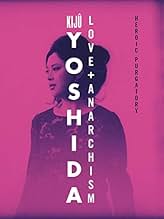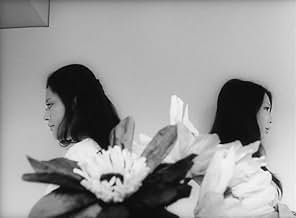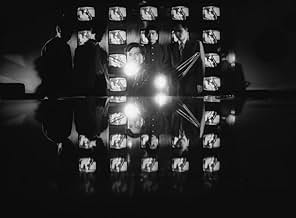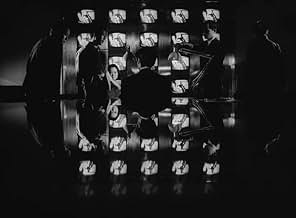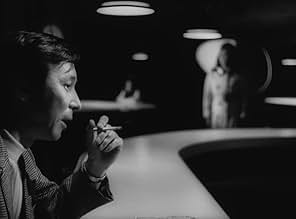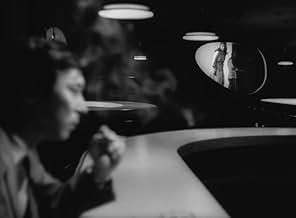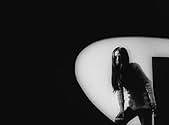Adicionar um enredo no seu idiomaAn engineer's wife returns home with a lost teenager. A man posing as her dad tries to get her back, causing the engineer to recall his youth as a revolutionary, obscured by dreamlike disrup... Ler tudoAn engineer's wife returns home with a lost teenager. A man posing as her dad tries to get her back, causing the engineer to recall his youth as a revolutionary, obscured by dreamlike disruptions of time and space, fantasy and reality.An engineer's wife returns home with a lost teenager. A man posing as her dad tries to get her back, causing the engineer to recall his youth as a revolutionary, obscured by dreamlike disruptions of time and space, fantasy and reality.
Avaliações em destaque
From the very first frame, you know you are in for something different. The first thing that strikes you is the composition of the visuals. Each frame is an avant-garde work of art. If you turned off the sound and simply watched the visuals it would be worth the time.
The plot is complex and enigmatic. Intentionally ambiguous, it deals with love, truth, reality and the validity of political action. Although it is enigmatic, it is not boring. Instead it stimulates thought on these subject. The ambiguity of the plot means that there are no easy answers and viewers must make up their own minds on these weighty subjects. It also means that the film can be viewed several times.
This is an "art film". The director was a major figure in the Japanese new wave that started in the 60's and watching this film one is reminded of Alain Resnais, although this is not a copy of his style. The film is part of a trilogy of "sex and politics" films (Eros plus massacre; Heroic Purgatory ; Coup D'Etat).
You will not like this if you are looking for an entertaining film, or a film with action, sex, comedy, great one liners and all those other things that can make a film entertaining. There is nothing wrong with such films but this one one of them. It is a film that will make you think.
Finding a good copy of this or any of this director's other films can be difficult. This particular film can be found if you search the internet but it is usually found with very poor and incomprehensible subtitles. Recently someone has made a new subtitle translation but it is very hard to find. I wouldn't recommend the film without this new translation unless you are a Japanese speaker. Subtitles that begin "This morning I lift the floor There are 3 worms" should be avoided. Those that begin "This morning, there were three cockroaches," are good. But on the other hand just watching the visuals can be worth it.
The plot is complex and enigmatic. Intentionally ambiguous, it deals with love, truth, reality and the validity of political action. Although it is enigmatic, it is not boring. Instead it stimulates thought on these subject. The ambiguity of the plot means that there are no easy answers and viewers must make up their own minds on these weighty subjects. It also means that the film can be viewed several times.
This is an "art film". The director was a major figure in the Japanese new wave that started in the 60's and watching this film one is reminded of Alain Resnais, although this is not a copy of his style. The film is part of a trilogy of "sex and politics" films (Eros plus massacre; Heroic Purgatory ; Coup D'Etat).
You will not like this if you are looking for an entertaining film, or a film with action, sex, comedy, great one liners and all those other things that can make a film entertaining. There is nothing wrong with such films but this one one of them. It is a film that will make you think.
Finding a good copy of this or any of this director's other films can be difficult. This particular film can be found if you search the internet but it is usually found with very poor and incomprehensible subtitles. Recently someone has made a new subtitle translation but it is very hard to find. I wouldn't recommend the film without this new translation unless you are a Japanese speaker. Subtitles that begin "This morning I lift the floor There are 3 worms" should be avoided. Those that begin "This morning, there were three cockroaches," are good. But on the other hand just watching the visuals can be worth it.
Yoshida's films are luminous, ethereal creations, languid love affairs blown into abstract shape by memory and time. In the period when he studied/essayed the great Antonioni, he gave us films of simple, perhaps ponderous beauty. But with Eros+Massacre he finally unraveled. This is a companion piece to that labyrinth.
I can't imagine what it must've been to see this back in 1970 with fresh eyes, what possibilities of cinema it may have opened. Thirty years later I can see that some of the things Yoshida foresaw panned out, others didn't. But this film is a maddening enigma that stands the test of that time passed, meaning it's not simply a cultural artifact of New Wave and the time when the revolutionary spirit was believed to be a force of change, but an entire evolutionary phase of cinema, New Wave before and after.
If the movie works then as more than bold experiment, it's because these particular ephemeral struggles are abstracted, the lifetime they in turn inspire and disappoint is fragmented, past and future spinning out of original frameworks. What we get from this rearrangement is a snapshot of human beings caught into disparate planes of existence, wishing to see or connect or recognize meaning in what they do.
In a brilliant scene that takes place in the 80's, one of many flash forwards into future or imaginary time, the cast of characters is assembled in an open space to hold court. Unable to properly remember a key event, they turn to a figure perched in a high chair holding a film camera to arbitrate. This surrogate filmmaker allows them back in time.
We see how the two lovers met, we see where that love brought them. We get here a beautiful realization, that the man's greatest aspiration, who is a famous scientist, is to be a good husband to his wife. The camera looks back at Mariko Okada, standing a little back from her husband being interviewed, and we see her gracefully, stoically looking out a window. Yoshida's gentle tribute to the love of his life, his wife in real life.
We see an entire life, shared by these two people, be trapped in moral dilemmas and modern anxieties, thought to be important at the time, lifechanging, with hindsight though nothing but trivial. We see them struggle to remember or forget. Yoshida gives us here a bitter last goodbye to the spirit of '68, showing us how the romance with the social struggle grew sour. These ideas having led nowhere, our only chance for happiness is with our other half that completes us. The one romance that matters.
The film is the final moments of consciousness, memory looking back upon itself.
I can't imagine what it must've been to see this back in 1970 with fresh eyes, what possibilities of cinema it may have opened. Thirty years later I can see that some of the things Yoshida foresaw panned out, others didn't. But this film is a maddening enigma that stands the test of that time passed, meaning it's not simply a cultural artifact of New Wave and the time when the revolutionary spirit was believed to be a force of change, but an entire evolutionary phase of cinema, New Wave before and after.
If the movie works then as more than bold experiment, it's because these particular ephemeral struggles are abstracted, the lifetime they in turn inspire and disappoint is fragmented, past and future spinning out of original frameworks. What we get from this rearrangement is a snapshot of human beings caught into disparate planes of existence, wishing to see or connect or recognize meaning in what they do.
In a brilliant scene that takes place in the 80's, one of many flash forwards into future or imaginary time, the cast of characters is assembled in an open space to hold court. Unable to properly remember a key event, they turn to a figure perched in a high chair holding a film camera to arbitrate. This surrogate filmmaker allows them back in time.
We see how the two lovers met, we see where that love brought them. We get here a beautiful realization, that the man's greatest aspiration, who is a famous scientist, is to be a good husband to his wife. The camera looks back at Mariko Okada, standing a little back from her husband being interviewed, and we see her gracefully, stoically looking out a window. Yoshida's gentle tribute to the love of his life, his wife in real life.
We see an entire life, shared by these two people, be trapped in moral dilemmas and modern anxieties, thought to be important at the time, lifechanging, with hindsight though nothing but trivial. We see them struggle to remember or forget. Yoshida gives us here a bitter last goodbye to the spirit of '68, showing us how the romance with the social struggle grew sour. These ideas having led nowhere, our only chance for happiness is with our other half that completes us. The one romance that matters.
The film is the final moments of consciousness, memory looking back upon itself.
"Heroic Purgatory" (1970) was my first Yoshida, and I'll certainly try to see more than the three films released by Arrow in the "Love + Anarchism" set.
It's definitely avant-garde in the classic sense of the term, marching in the vanguard of utilizing fluid experimental dream language. I know I'll eventually revisit Godard and the French New Wave in the future, whose work at this writing I'd consider dull and uninteresting, but this is the exact opposite of dull: not only is it visually masterful, the story, no matter how evasive and at times elliptical like an afterthought, is actually interesting.
I definitely see, based on this one film, how Yoshida might have influenced Wong, or even Malick's "modern style" from "The Tree of Life" (2011) onwards. And if not, having seen this one really does add to the aforementioned directors' films.
I'm not sure whether the experience would lend itself for a repeat viewing anytime soon, since because of the elliptical nature of the film, despite the complete mastery of the visuals, and Yoshida is clearly a master at work, the film is purposefully obscure. But if one approaches it like a dream, it's a wonderful audiovisual journey through some very unusual ways to see the world.
It's fun to know really nothing at all about Yoshida, other than him starting out under Kinoshita's tutelage. It strongly resembles the Ozu-Imamura relationship, where the "old", strict formalism (or what would certainly seem as such by the new generation of filmmakers) in its part has influenced the radical swerves of the apprentices. I'd really like to know what he thought of Teshigahara.
It's definitely avant-garde in the classic sense of the term, marching in the vanguard of utilizing fluid experimental dream language. I know I'll eventually revisit Godard and the French New Wave in the future, whose work at this writing I'd consider dull and uninteresting, but this is the exact opposite of dull: not only is it visually masterful, the story, no matter how evasive and at times elliptical like an afterthought, is actually interesting.
I definitely see, based on this one film, how Yoshida might have influenced Wong, or even Malick's "modern style" from "The Tree of Life" (2011) onwards. And if not, having seen this one really does add to the aforementioned directors' films.
I'm not sure whether the experience would lend itself for a repeat viewing anytime soon, since because of the elliptical nature of the film, despite the complete mastery of the visuals, and Yoshida is clearly a master at work, the film is purposefully obscure. But if one approaches it like a dream, it's a wonderful audiovisual journey through some very unusual ways to see the world.
It's fun to know really nothing at all about Yoshida, other than him starting out under Kinoshita's tutelage. It strongly resembles the Ozu-Imamura relationship, where the "old", strict formalism (or what would certainly seem as such by the new generation of filmmakers) in its part has influenced the radical swerves of the apprentices. I'd really like to know what he thought of Teshigahara.
Pure geometric chaos in Yoshida Yoshishige's "Heroic Purgatory", which is also the second film in his Trilogy of Japanese Radicalism, produced under the aegis of Japan's legendary Art Theater Guild. This is probably my fav film of his, especially in terms of visuals. Watching it feels like falling into a trance, I keep chasing the high of watching Heroic Purgatory, but no other Yoshida movie has come close.
Yoshida's strength is without a doubt his image composition, the way he frames his shots is so meticulously done. The story centers around an engineer and his wife (played by the great Hiroshi Inagaki regular Mariko Okada, who is also Yoshida's spouse and long term collaborator) who find a lost teenager leading the engineer to recall his younger days as a political radical. As this narrative plays out, Nanako's husband tells the story of his past when they met in a time when he was involved in reformist politics. Underneath, this film explores the past, present and future of the early 1970's political radicalism in a volatile Japan. As the film progresses, the temporal space is crushed mixing past, present, and future together. Abandoning linear storytelling for an ethereal trip into a labyrinth of memories, fears and delusions Yoshida gives viewers a stylistic feast injected into a revolutionary thriller. Cinematographer Motokichi Hasegawa and editor Hiroyuki Yasuoka, presents a visual language that recalls other great films (appropriate given Yoshida's background as a film critic...he also wrote a book on the films of Yasujiro Ozu) while continually exploring new ground; there's so many compositions, so many scenes that defy the conventional expectations of filmmaking...it's absolutely intoxicating to behold. Toshi Ichiyanagi's score is also a tremendous win, giving an atmospheric almost science fiction-like vibe to accentuate the stunning visuals.
Yoshida's strength is without a doubt his image composition, the way he frames his shots is so meticulously done. The story centers around an engineer and his wife (played by the great Hiroshi Inagaki regular Mariko Okada, who is also Yoshida's spouse and long term collaborator) who find a lost teenager leading the engineer to recall his younger days as a political radical. As this narrative plays out, Nanako's husband tells the story of his past when they met in a time when he was involved in reformist politics. Underneath, this film explores the past, present and future of the early 1970's political radicalism in a volatile Japan. As the film progresses, the temporal space is crushed mixing past, present, and future together. Abandoning linear storytelling for an ethereal trip into a labyrinth of memories, fears and delusions Yoshida gives viewers a stylistic feast injected into a revolutionary thriller. Cinematographer Motokichi Hasegawa and editor Hiroyuki Yasuoka, presents a visual language that recalls other great films (appropriate given Yoshida's background as a film critic...he also wrote a book on the films of Yasujiro Ozu) while continually exploring new ground; there's so many compositions, so many scenes that defy the conventional expectations of filmmaking...it's absolutely intoxicating to behold. Toshi Ichiyanagi's score is also a tremendous win, giving an atmospheric almost science fiction-like vibe to accentuate the stunning visuals.
An engineer's wife returns home with a lost teenager. A man posing as her dad tries to get her back, causing the engineer to recall his youth as a revolutionary, obscured by dreamlike disruptions of time and space, fantasy and reality.
Although I did not care for "Eros" the way some people do, I actually liked this one a bit more. Yes, the picture is washed out and I wish it was not. But the clever angles and framing made me enjoy the film from the opening shots. It has a very science fiction feeling to it at times, and I wish it had more of that.
As part of the "radicalism trilogy", I would say this is my favorite of the three. I am not crazy about Yoshishige Yoshida, but this film at least struck a bit of a cord with me.
Although I did not care for "Eros" the way some people do, I actually liked this one a bit more. Yes, the picture is washed out and I wish it was not. But the clever angles and framing made me enjoy the film from the opening shots. It has a very science fiction feeling to it at times, and I wish it had more of that.
As part of the "radicalism trilogy", I would say this is my favorite of the three. I am not crazy about Yoshishige Yoshida, but this film at least struck a bit of a cord with me.
Você sabia?
- CuriosidadesThe second movie in Yoshishige Yoshida's unofficial trilogy on Japanese radicalism. The other two titles are Eros + Massacre (1969) and Kaigenrei (1973).
Principais escolhas
Faça login para avaliar e ver a lista de recomendações personalizadas
- How long is Heroic Purgatory?Fornecido pela Alexa
Detalhes
- Tempo de duração
- 1 h 58 min(118 min)
- Cor
- Mixagem de som
- Proporção
- 1.33 : 1
Contribua para esta página
Sugerir uma alteração ou adicionar conteúdo ausente

